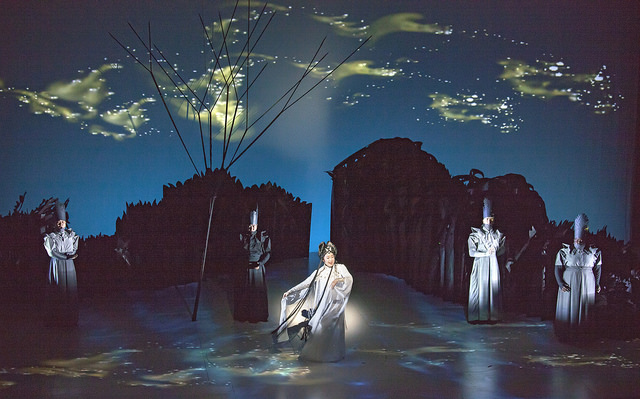Spoleto Journal: And She’s Got to Get Herself Back to the Garden
It is a trusim that opera is a collaborative endeavor but it is also true that the lion’s share of the credit, or blame, for its success usually goes to the composer. We may choose to see an opera because we like a particular singer, or director, or librettist, but, for better or worse, the composer is the ultimate “owner” of the work. Nobody says John Adams and Alice Goodman’s Nixon in China, although Goodman’s libretto is essential to the piece. Few people say Philip Glass and Robert Wilson’s Einstein at the Beach. The Cave is described by Wikipedia as a multimedia opera in three acts by Steve Reich to an English libretto by his wife Beryl Korot when, in fact, it is at least as much her work as his.
It seem inevitable then that Paradise Interrupted, the installation one-act opera that is headlining Spoleto this year, will become known to future generations as Huang Ruo’s Paradise Interrupted. And he deserves lots of credit. The young Chinese-born composer’s composition masterfully blends 600-year-old Kunqu, one of the oldest forms of Chinese opera, with contemporary Western music to create a sound landscape that is mesmerizing and ethereal, capturing perfectly the hope, longing and ultimate resignation of The Woman (sung gloriously by Chinese opera star Qian Yi).
But, the truth is, Paradise Interrupted is mostly Jennifer Wen Ma’s opera. Wen Ma, a Chinese-born interdisciplinary visual artist conceived, directed and designed the work, as well as co-wrote the libretto. The idea came to her, she says, while she was standing beneath her own art installation called Hanging Garden in Ink, a 60-foot-long, 6-ton suspended garden made of live trees dipped in black ink , in Beijing. Suddenly she imagined the black garden as an arresting and beautiful setting for an opera.
Set against an ever changing backdrop of abstract digital images that reflect the singer’s mood shifts, the garden that greets the audience of Paradise Interrupted is an assemblage of laser-cut paper painted with black ink that is unfolded, accordian-like, and closed up again by the performers throughout the drama. The effect is that the garden appears to move in response to the singers’ voices. The effect is stunning. Eight feet in height, the garden’s stark presence creates a looming landscape that takes on a life of its own. With some many moving parts and such seemingly fragile material, the potential for a staging disaster seemed so ominous that I found myself holding my breath as if watching a tightrope walker.
The chances are good that you’ve seen Ma’s work before even if you’re not an opera goer. In 2008, she was one of the seven members on the core creative team for the opening and closing ceremonies of the Beijing Olympics, and the chief designer for visual and special effects. She won an Emmy for the US broadcast of the ceremony.
The story is drawn from Eve’s expulsion from the Garden of Eden and and Du Liniang from the famous 1598 Ming Dynasty opera The Peony Pavilion. In a dream, a woman meets her lover and searches for an unattainable ideal–a return to paradise–as a vast interactive garden grows from an empty stage in response to her voice, only to disappear as her dream ends. With few movements and gestures, Qian’s lyrical, ethereal voice carried the story, ably abetted by bass-baritone Ao Li, baritone Joo Won Kang, tenor Joseph Dennis and countertenor John Holiday, whose singing especially stood out. Conductor John Kennedy has become an important go-to guy for New Music.
If you missed it at Spoleto, you’ll have to wait for it to come to the Lincoln Center Festival next year..![]()
